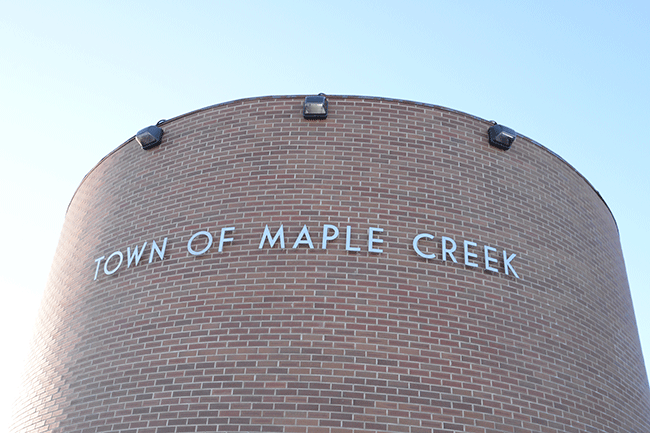Cypress Lodge repurposing talks continue
Posted on April 30, 2015 by Maple Creek FILE PHOTO
FILE PHOTOBy Marcia Love
Future plans for Cypress Lodge and recycling were two of the topics discussed at council’s regular meeting on April 28.
Last fall, the town reached an agreement with Cypress Health Region to purchase the nursing home and sell it with the intent of having the building converted to an assisted living facility. Upon purchase from the town, a contract would be in place stating what is expected. Once turned over to the new owner, the town would no longer be involved in it.
Council received three proposals and has selected one, but no agreements have been signed at this point.
“They are reviewing the sales agreement and we are working on negotiations,” explained town administrator Michele Schmidt.
In other business discussed, Mayor Barry Rudd and several councillors attended a recycling and waste management conference hosted by the Saskatchewan Waste Reduction Council in Saskatoon, which offered a wealth of information.
“They’re really shooting for communities to be trying to remove between 70 and 90 per cent of their recyclables out of their landfill,” said Councillor Ellaine Hawrylak, adding this would be easier if there was a market for more of that material.
Reducing waste at large community functions was also touched on. Councillor Barry Elderkin said some cities are opting to use compostable food containers, plates and cutlery at large events, despite sometimes costing more money. He touched on how this could be applied at functions in Maple Creek.
“One of the things they did was have someone at each of the recycling locations to direct people and say, ‘No, sir, that goes in this container and your food waste goes in this one,'” he explained. “So they were able to reduce the amount that was going out to the landfill.”
Bottled water is no longer distributed at some of these events. Instead potable water locations are set up where people can refill their own reusable water bottles free of charge.
During the conference itself, the Saskatchewan Waste Reduction Council encouraged paperless options such as using smart phones and tablets for meetings and keeping notes. Power-point presentations were made to reduce paper usage as well. Recycling containers were placed everywhere food was consumed, and unnecessary food service packaging was eliminated when possible.
Pharmaceuticals being flushed and causing environmental concerns was also raised.
Glass makes up three per cent of the waste stream, with the majority being beer bottles. Plastics replacing glass is causing a problem as well. Because of this, some companies are switching back to glass bottles, which can be refilled and reused up to 50 times. Glass can also be recycled and used in highway paint.
Regarding flood protection, the town has received word from the Water Security Agency that it does not qualify for the province’s Emergency Flood Damage Reduction Program that was recently announced. The town did not qualify for the program because it is not in immediate danger. But Schmidt said there is another program that will be announced this fall or early next spring which the town may be eligible for. The application would allow the berm to be finished to the edge of town property against CP Rail property.
The educational property tax mill rate has been established and will remain the same as 2014. Agricultural property is at 2.67 mills, residential is 5.03, commercial and industrial is 8.28, and resources such as oil, gas, mining and pipelines is 11.04.
Council approved the recommendation to offer Lynn Needham the position of environmental services manager effective May 1.
Councillor Kevin Harrigan said the public works crew has toured the town and identified streets that will be prioritized for paving.
Problems have arose at the arena’s food booth as volunteers are missing their designated times to run it. The arena board is now discussing another option which would see fees increased for user groups.
“They’re having a lot of problems with parents not showing up,” explained Councillor Michelle McKenzie. “At some major functions, they don’t have anyone to run the booth.”
To resolve this, the board has talked about charging a fee to users, which would be used by food booth operators Carson and Anne Currah to hire workers.
Parents are required to pay a booth bond for the season, for which they are reimbursed if they work their shift. If parent volunteers don’t fill their designated time slot, the money is used to hire someone else to work it.
The board also discussed having a coffee machine and healthy snacks in the vending machine so the food booth isn’t unnecessarily open when the rink isn’t busy.
Starting in May, council’s regular meetings will be broadcast online through its website as it now has a new webcam with better quality sound.


Leave a Reply
You must be logged in to post a comment.